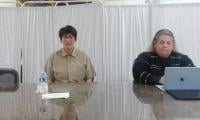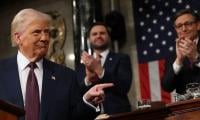NA-122 weakest constituency for PML-N in Lahore
Islamabad Of 13 Lahore district seats of the National Assembly, NA-122 constituency was the weakest for the Pakistan Muslim League-Nawaz (PML-N) in terms of the massive lead that its candidates had scored over their rivals in the fight for twelve seats in the 2013 general elections. However, its nominee Khawaja
By Tariq Butt
October 15, 2015
Islamabad
Of 13 Lahore district seats of the National Assembly, NA-122 constituency was the weakest for the Pakistan Muslim League-Nawaz (PML-N) in terms of the massive lead that its candidates had scored over their rivals in the fight for twelve seats in the 2013 general elections.
However, its nominee Khawaja Ahmed Hassan had lost one seat, NA-126, to Pakistan Tehreek-e-Insaf (PTI) representative Shafqat Mehmood with a margin of just 5,453 votes. The PML-N had won all the remaining twelve seats with extraordinary leads, proving its convincing hold over the Lahore district.
Ayaz Sadiq had clinched NA-122 with a margin of 8,862 ballots, which was the lowest compared to the numerical edge that the PML-N contestants had over their challengers in other constituencies, according to the Election Commission of Pakistan (ECP) record.
The former speaker won Sunday’s cliff-hanger, by getting 74,525 votes, 2,443 ballots more than 72,082 votes of PTI’s Aleem Khan.
In NA-118, the PML-N’s lead was 59,730 votes. PTI ticket-holder Hamid Zaman, who had bagged 43,616 votes, had lost to PML-N’s Riaz Malik, who had got 103,346 ballots.
In NA-119, the lead was 66,914 votes. Here PML-N’s Hamza Shahbaz was successful by receiving 107,735 ballots, trouncing PTI’s Mohammad Madni, who had secured 40,821 votes.
In NA-120, the victory margin was 39,329 votes. PML-N President Nawaz Sharif had secured 91,683 votes as against 52,354 ballots of PTI’s Yasmeen Raashid.
In NA-121, the lead
was 46,167 votes. Here PML-N’s Mehr Ishtiaq Ahmed (114,474 votes) had routed PTI’s Hammad Azfar (58,307 ballots).
Likewise, NA-123 was taken by PML-N’s Pervez Malik by pocketing 126,878 votes as against 40,617 ballots of PTI’s Atif Chaudhry. The lead came to 86,261 ballots.
The victory margin of PML-N’s Rohail Asghar (119,312 votes) in NA-124 against PTI’s Waleed Iqbal (42,561 ballots) was 77,751 votes.
PTI’s Hamid Khan (84,495 ballots) had lost to PML-N’s Khawaja Saad Rafique with a margin of 38,921 votes in NA-125.
In NA-127, PML-N’s Waheed Alam Khan (102,080 votes) had defeated PTI’s Nasrullah Mughal (45,787 ballots) with a lead of 56,293 votes.
Afzal Khokhar (124,107 ballots) of the PML-N had routed PTI’s Karamat Khokhar (78,369 votes) with an edge of 55,738 ballots in NA-128.
PML-N’s Shazia Mubashir (44,894 votes) had won NA-129 by leaving PTI’s Mansha Sindhu (26,071 ballots) behind by 18,823 votes.
In the NA-130 contest, PTI candidate Talib Hussain Sindhu had stood third with 22,066 votes. The second position was taken by Pakistan People’s Party (PPP) ticket-holder Samina Khalid Gurki (32,569 votes) while PML-N’s Sohail Shaukat Butt (88,842 ballots) had defeated her with a lead of 56,273 votes.
The voter turnout witnessed on Sunday in all the three constituencies was considerably low compared to the 2013 general elections. This showed that in spite of the massive mobilization by the contestants and their parties, the electorate did not come out in a huge number to exercise their right of vote although the number of voters went up with the registration of new ones.
This time, voters’ participation in the purely urban constituency of NA-122 was 43pc as against 58.48pc of 2013. Similarly, the turnout in NA-144 Okara was 51pc compared to 58pc of 2013. For the Punjab Assembly seat, PP-147, another totally urban area, the turnout now was 44.42pc while it was 56.68pc in the general elections.
Apart from the hectic campaign by a host of second tier leaders of the PML-N, PTI Chairman Imran Khan held three public meetings, two in Lahore and one in Okara, during the electioneering.
However, the voters’ participation has generally been low in the by-elections as against the parliamentary polls as
the electorate feel that the
outcome of the by-poll will
not bring any signifi-
cant change.
Of 13 Lahore district seats of the National Assembly, NA-122 constituency was the weakest for the Pakistan Muslim League-Nawaz (PML-N) in terms of the massive lead that its candidates had scored over their rivals in the fight for twelve seats in the 2013 general elections.
However, its nominee Khawaja Ahmed Hassan had lost one seat, NA-126, to Pakistan Tehreek-e-Insaf (PTI) representative Shafqat Mehmood with a margin of just 5,453 votes. The PML-N had won all the remaining twelve seats with extraordinary leads, proving its convincing hold over the Lahore district.
Ayaz Sadiq had clinched NA-122 with a margin of 8,862 ballots, which was the lowest compared to the numerical edge that the PML-N contestants had over their challengers in other constituencies, according to the Election Commission of Pakistan (ECP) record.
The former speaker won Sunday’s cliff-hanger, by getting 74,525 votes, 2,443 ballots more than 72,082 votes of PTI’s Aleem Khan.
In NA-118, the PML-N’s lead was 59,730 votes. PTI ticket-holder Hamid Zaman, who had bagged 43,616 votes, had lost to PML-N’s Riaz Malik, who had got 103,346 ballots.
In NA-119, the lead was 66,914 votes. Here PML-N’s Hamza Shahbaz was successful by receiving 107,735 ballots, trouncing PTI’s Mohammad Madni, who had secured 40,821 votes.
In NA-120, the victory margin was 39,329 votes. PML-N President Nawaz Sharif had secured 91,683 votes as against 52,354 ballots of PTI’s Yasmeen Raashid.
In NA-121, the lead
was 46,167 votes. Here PML-N’s Mehr Ishtiaq Ahmed (114,474 votes) had routed PTI’s Hammad Azfar (58,307 ballots).
Likewise, NA-123 was taken by PML-N’s Pervez Malik by pocketing 126,878 votes as against 40,617 ballots of PTI’s Atif Chaudhry. The lead came to 86,261 ballots.
The victory margin of PML-N’s Rohail Asghar (119,312 votes) in NA-124 against PTI’s Waleed Iqbal (42,561 ballots) was 77,751 votes.
PTI’s Hamid Khan (84,495 ballots) had lost to PML-N’s Khawaja Saad Rafique with a margin of 38,921 votes in NA-125.
In NA-127, PML-N’s Waheed Alam Khan (102,080 votes) had defeated PTI’s Nasrullah Mughal (45,787 ballots) with a lead of 56,293 votes.
Afzal Khokhar (124,107 ballots) of the PML-N had routed PTI’s Karamat Khokhar (78,369 votes) with an edge of 55,738 ballots in NA-128.
PML-N’s Shazia Mubashir (44,894 votes) had won NA-129 by leaving PTI’s Mansha Sindhu (26,071 ballots) behind by 18,823 votes.
In the NA-130 contest, PTI candidate Talib Hussain Sindhu had stood third with 22,066 votes. The second position was taken by Pakistan People’s Party (PPP) ticket-holder Samina Khalid Gurki (32,569 votes) while PML-N’s Sohail Shaukat Butt (88,842 ballots) had defeated her with a lead of 56,273 votes.
The voter turnout witnessed on Sunday in all the three constituencies was considerably low compared to the 2013 general elections. This showed that in spite of the massive mobilization by the contestants and their parties, the electorate did not come out in a huge number to exercise their right of vote although the number of voters went up with the registration of new ones.
This time, voters’ participation in the purely urban constituency of NA-122 was 43pc as against 58.48pc of 2013. Similarly, the turnout in NA-144 Okara was 51pc compared to 58pc of 2013. For the Punjab Assembly seat, PP-147, another totally urban area, the turnout now was 44.42pc while it was 56.68pc in the general elections.
Apart from the hectic campaign by a host of second tier leaders of the PML-N, PTI Chairman Imran Khan held three public meetings, two in Lahore and one in Okara, during the electioneering.
However, the voters’ participation has generally been low in the by-elections as against the parliamentary polls as
the electorate feel that the
outcome of the by-poll will
not bring any signifi-
cant change.
-
 John Davidson Breaks Silence On 2026 BAFTA Awards Racial Slur: 'Please, Don't Judge Me'
John Davidson Breaks Silence On 2026 BAFTA Awards Racial Slur: 'Please, Don't Judge Me' -
 'First Robert Carradine, Now Katherine Short': Fans Mourn Back-to-back Shocking Losses
'First Robert Carradine, Now Katherine Short': Fans Mourn Back-to-back Shocking Losses -
 King Harald Rushed To Hospital As Palace Issues Statement On Health Scare
King Harald Rushed To Hospital As Palace Issues Statement On Health Scare -
 Meghan Markle Gets Dragged For New Lilibet Photo
Meghan Markle Gets Dragged For New Lilibet Photo -
 Prince William To ‘open Doors’ For Middletons, Make Them Royals
Prince William To ‘open Doors’ For Middletons, Make Them Royals -
 Andrew Arrest Fallout: Cops Conclude Six-day Raid At Ex-prince's Home As Misconduct Probe Intensifies
Andrew Arrest Fallout: Cops Conclude Six-day Raid At Ex-prince's Home As Misconduct Probe Intensifies -
 Martin Short Adopted Daughter Katherine Dies By 'suicide' At 42
Martin Short Adopted Daughter Katherine Dies By 'suicide' At 42 -
 Louvre Museum Director Resigns After $104m Crown Jewels Theft
Louvre Museum Director Resigns After $104m Crown Jewels Theft -
 Sarah Ferguson 'crying' After Andrew Arrest
Sarah Ferguson 'crying' After Andrew Arrest -
 Ghislaine Maxwell ‘late Night Massage’ Demands Exposed By Victim
Ghislaine Maxwell ‘late Night Massage’ Demands Exposed By Victim -
 Kristen Bell Gets Honest About Her Marriage To Husband Dax Shepard
Kristen Bell Gets Honest About Her Marriage To Husband Dax Shepard -
 At Least 25 Dead, Hundreds Missing After Flash Floods, Landslides Strike Brazil
At Least 25 Dead, Hundreds Missing After Flash Floods, Landslides Strike Brazil -
 King Charles' Office Breaks Silence After Prince Edward's Last-minute Withdrawal
King Charles' Office Breaks Silence After Prince Edward's Last-minute Withdrawal -
 Timothee Chalamet Shares Major Learnings After Working With 'favourite' Director Christopher Nolan
Timothee Chalamet Shares Major Learnings After Working With 'favourite' Director Christopher Nolan -
 Jennifer Garner Makes Honest Admission About Raising Kids After Separation: 'I Became Mom And Dad'
Jennifer Garner Makes Honest Admission About Raising Kids After Separation: 'I Became Mom And Dad' -
 Timothee Chalamet Heaps Praise For Matthew McConaughey's Work In Super Hit Project 'Interstellar'
Timothee Chalamet Heaps Praise For Matthew McConaughey's Work In Super Hit Project 'Interstellar'



